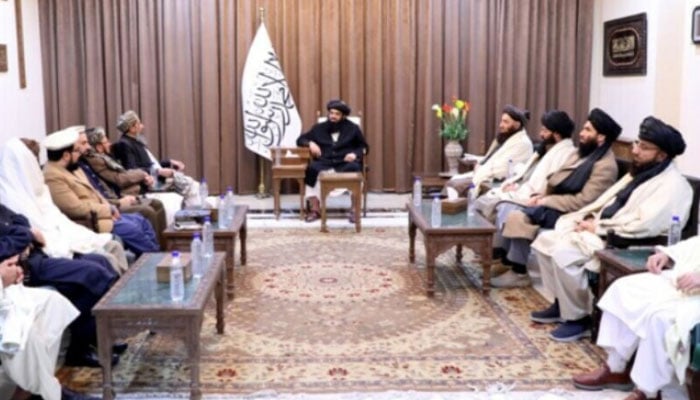Afghan Taliban ‘warn TTP’ against attacks in Pakistan
Taliban government warned Tehreek-e-Taliban Pakistan leadership against using the Afghan soil for attacks inside Pakistan
ISLAMABAD: The Taliban government has strictly warned the Tehreek-e-Taliban Pakistan leadership against using the Afghan soil for attacks inside Pakistan and noted that such acts have weakened the relations between the two peoples, said a member of the delegation that recently visited Kabul.
A delegation led by Jamiat Ulema-e-Islam (Sami) head, Maulana Hamid-ul-Haq, went to Kabul. Hamid is the son of the late Maulana Sami-ul-Haq from whose madrassa, Dar-ul-Uloom Haqqania, several Taliban leaders had graduated. The visit was coordinated by Asrar Madani, the head of the International Research Council for Religious Affairs, an organisation that studies the Islamic Movement. This was the second high-profile visit after Maulana Fazlur Rehman who went there in January.
Taliban leaders told the visiting delegates that some four weeks ago, a meeting was called in which TTP leaders like Mufti Noor Wali Mehsud, Hafiz Gul Bahadur and others were also in attendance. Mulla Muhammad Hassan, the prime minister and some of his ministers represented the Afghan government. In the meeting, the TTP leadership was told in unequivocal terms that the attacks inside Pakistan have weakened their relations with the people and the government of Pakistan.
Things have improved since that meeting, Madani said, quoting the Taliban government officials. However, he added that Taliban and, in particular, Haqqani network, believes that resumption of dialogue with TTP could improve the relations. Pakistani officials seem averse to this idea as the TTP in the past secured concessions in the form of release of their prisoners in Pakistani jails, who returned to their native areas but didn’t remain peaceful.
Madani said the Taliban government was concerned about the repatriation by the Pakistani government of Afghan refugees in haste. Those returning after 20-40 years are strangers even in their native areas. The entire landscape has changed in the case of many refugees and they are struggling to settle down. Madani explained the Taliban government said that Pakistan being the host for decades could have waited for more time or at least could make this decision after taking the Afghan government in confidence.
Many in the Taliban leadership have also been refugees in Pakistan for decades. Mulla Haibatullah, currently the supreme leader, has spent almost 15 years in a madrassa in Kuchlak (Quetta) where he taught as Sheikh-ul-Hadith. Maulana Abdul Hakeem Haqqani, the current Chief Justice of Afghanistan, had been teaching in a madrassa in Pushtunabad (Quetta). Amir Khan Muttaqi, the foreign minister, lived in Quetta. Khalil-ul-Rehman Haqqani, minister for refugees, lived in Peshawar.
Pakistan says the repatriation policy was mainly aimed at fighting terrorism. The authorities have explained that Afghan nationals were found to be involved in attacks against the government and the army, including 14 of this year’s 24 suicide bombings.
Interim Prime Minister Anwaar-ul-Haq Kakar said in November 2023, “A significant portion of those involved in criminal and terrorist activities are among these illegal immigrants.”
-
 Fresh Details Of King Charles, Queen Camilla's US Visit Emerge Amid Andrew Investigation
Fresh Details Of King Charles, Queen Camilla's US Visit Emerge Amid Andrew Investigation -
 Iran 'set To Buy' Chinese Carrier-killer Missiles As US Forces Gather In Region
Iran 'set To Buy' Chinese Carrier-killer Missiles As US Forces Gather In Region -
 Prince Harry And Meghan Unlikely To Meet Royals In Jordan
Prince Harry And Meghan Unlikely To Meet Royals In Jordan -
 Hero Fiennes Tiffin Shares Life-changing Advice He Received From Henry Cavill
Hero Fiennes Tiffin Shares Life-changing Advice He Received From Henry Cavill -
 Savannah Guthrie's Fans Receive Disappointing News
Savannah Guthrie's Fans Receive Disappointing News -
 Prince William Steps Out For First Solo Outing After Andrew's Arrest
Prince William Steps Out For First Solo Outing After Andrew's Arrest -
 Jake Paul Chooses Silence As Van Damme Once Again Challenges Him To Fight
Jake Paul Chooses Silence As Van Damme Once Again Challenges Him To Fight -
 Google Disrupts Chinese-linked Hacking Groups Behind Global Cyber Attacks
Google Disrupts Chinese-linked Hacking Groups Behind Global Cyber Attacks -
 Four People Killed In Stabbing Rampage At Washington Home
Four People Killed In Stabbing Rampage At Washington Home -
 Meghan Pushes Prince Harry Into Territory That’s Dangerous To His Brand: ‘She Isn’t Hearing A Word Of It’
Meghan Pushes Prince Harry Into Territory That’s Dangerous To His Brand: ‘She Isn’t Hearing A Word Of It’ -
 Christina Applegate Reflects On Lasting Impact Of Being Molested In Childhood
Christina Applegate Reflects On Lasting Impact Of Being Molested In Childhood -
 Martin Short Makes Big Decision Following Tragic Death Of Daughter
Martin Short Makes Big Decision Following Tragic Death Of Daughter -
 Antarctica’s Mysterious ‘gravity Hole’: What’s Behind The Evolution Of Earth’s Deep Interior?
Antarctica’s Mysterious ‘gravity Hole’: What’s Behind The Evolution Of Earth’s Deep Interior? -
 Hilary Duff Addresses Ashley Tisdale's 'toxic Mom Group' Claims And Matthew Koma's Firey Response
Hilary Duff Addresses Ashley Tisdale's 'toxic Mom Group' Claims And Matthew Koma's Firey Response -
 Jack Hughes's Proximity To Trump Angers Tate McRae Fans
Jack Hughes's Proximity To Trump Angers Tate McRae Fans -
 Neve Campbell Opens Up About Her 'difficult Decision' To Not Sign 'Scream 6'
Neve Campbell Opens Up About Her 'difficult Decision' To Not Sign 'Scream 6'




